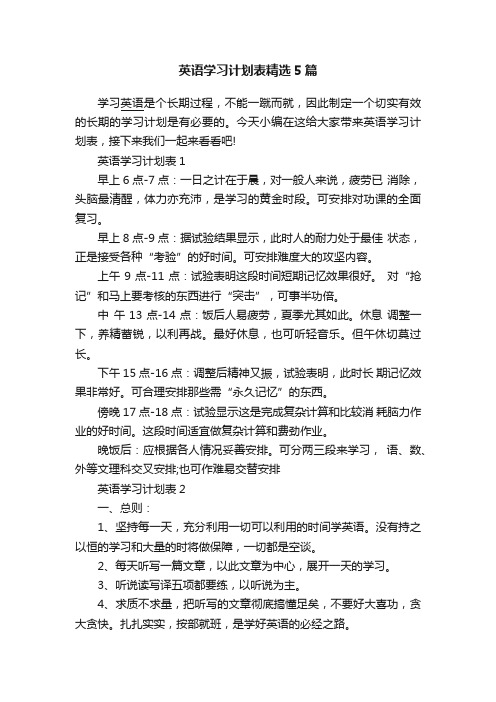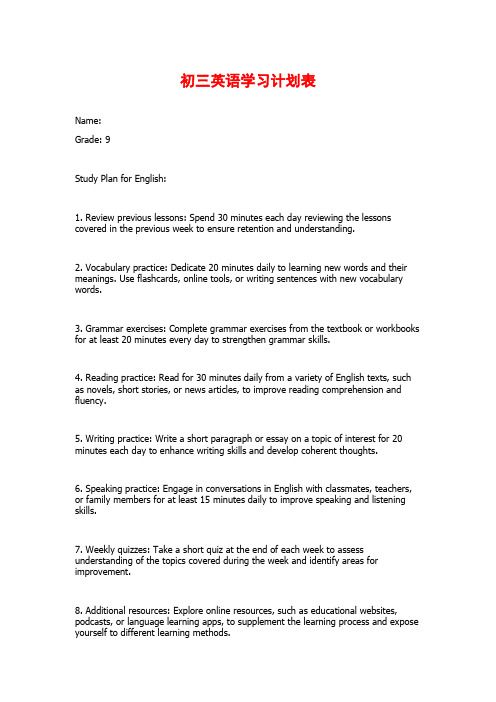初三英语学习计划表精品
初三英文学习计划表

针对初三学生的英语学习计划表可以如下安排,旨在全面提升英语能力和应对中考要求:第一阶段:巩固基础(9月初至10月中旬)目标:●巩固七年级与八年级的核心词汇和基本语法规则。
●提升听力理解与口语表达能力。
计划内容:1.每日任务:●背诵20个新单词,复习前一天的词汇。
●完成一篇短文的听力练习,记录并学习生词及短语。
●阅读一篇英文文章,总结大意并摘录好词好句。
2.每周任务:●完成一套基础语法习题,包括选择题、填空题等。
●参加一次小组讨论或角色扮演活动,提升口语交流能力。
●写一篇小短文,应用本周学习的新词汇和语法点。
3.每月任务:●总结本月学习的所有语法点,制作个人错题集。
●进行一次模拟测试,涵盖听力、阅读、写作等部分。
第二阶段:强化训练(10月中旬至12月底)目标:●加强阅读理解和完形填空技巧。
●提高写作水平,特别是应用文和议论文写作。
●深化语法运用,掌握复杂结构。
计划内容:1.每日任务:●增加到每日30个单词的学习量。
●练习一篇完形填空和两篇阅读理解。
●写一篇日记或小作文,注重使用复合句和连接词。
2.每周任务:●分析一篇优秀范文,学习其结构和用词。
●完成至少一次模拟听力测试,注意细节捕捉。
●参与至少一次英语角或外教互动,提升实际交流能力。
3.每月任务:●阅读一本英文简易读物或完成一系列学术文章阅读。
●写一篇较长的议论文,进行同伴互评和教师反馈。
●进行一次全面的自我评估,查漏补缺。
第三阶段:冲刺备考(1月至中考前)目标:●全面模拟中考,适应考试节奏。
●查缺补漏,针对弱点强化训练。
●心理调适,保持良好的考试状态。
计划内容:1.每日任务:●复习单词本和错题集,确保无遗漏。
●完成一套完整的模拟试题,包含所有考试部分。
●调整作息,保证充足睡眠。
2.每周任务:●分析上周模拟考试结果,针对性强化训练。
●参加至少一次考前辅导或讲座,获取最新考试动态和策略。
●保持适量的英语阅读,以保持语言感觉和扩大知识面。
1.每月任务:●进行至少两次全真模拟考试,模拟真实考试环境。
英语学习计划表精选5篇

英语学习计划表精选5篇学习英语是个长期过程,不能一蹴而就,因此制定一个切实有效的长期的学习计划是有必要的。
今天小编在这给大家带来英语学习计划表,接下来我们一起来看看吧!英语学习计划表1早上6点-7点:一日之计在于晨,对一般人来说,疲劳已消除,头脑最清醒,体力亦充沛,是学习的黄金时段。
可安排对功课的全面复习。
早上8点-9点:据试验结果显示,此时人的耐力处于最佳状态,正是接受各种“考验”的好时间。
可安排难度大的攻坚内容。
上午9点-11点:试验表明这段时间短期记忆效果很好。
对“抢记”和马上要考核的东西进行“突击”,可事半功倍。
中午13点-14点:饭后人易疲劳,夏季尤其如此。
休息调整一下,养精蓄锐,以利再战。
最好休息,也可听轻音乐。
但午休切莫过长。
下午15点-16点:调整后精神又振,试验表明,此时长期记忆效果非常好。
可合理安排那些需“永久记忆”的东西。
傍晚17点-18点:试验显示这是完成复杂计算和比较消耗脑力作业的好时间。
这段时间适宜做复杂计算和费劲作业。
晚饭后:应根据各人情况妥善安排。
可分两三段来学习,语、数、外等文理科交叉安排;也可作难易交替安排英语学习计划表2一、总则:1、坚持每一天,充分利用一切可以利用的时间学英语。
没有持之以恒的学习和大量的时将做保障,一切都是空谈。
2、每天听写一篇文章,以此文章为中心,展开一天的学习。
3、听说读写译五项都要练,以听说为主。
4、求质不求量,把听写的文章彻底搞懂足矣,不要好大喜功,贪大贪快。
扎扎实实,按部就班,是学好英语的必经之路。
5、把零碎的时间充分利用起来学英语,不断地重复。
6、听写是个学习英语的好方法,要继续加强。
7、早睡早起学英语。
8、抓住一套教材足矣,不要盲目的更换教材。
9、每天学习英语必须要有详细可行的计划,必须坚决执行,没有任何借口。
10、相信自己,一定能够学好英语。
二、分则:(一)听力:2、早晚都随身带mp3,一有空闲时间就反复听这篇短文,直到听烂为止。
九年级英语学科计划表

九年级英语学科计划表一、学习目标。
1. 掌握课本中的重点单词、短语、语法知识,提高词汇量至1800 - 2000个。
2. 能够熟练运用英语进行书面表达,写出结构清晰、语言流畅的作文,在中考作文中达到13 - 15分(满分15分)的水平。
3. 提升听力理解能力,在听力测试中得分率达到85%以上。
4. 提高阅读理解能力,能够快速准确地理解文章大意,并掌握文章中的细节信息。
二、学习资料。
1. 人教版九年级英语课本。
3. 英语周报(九年级版)4. 在线英语学习平台(如百词斩用于词汇学习、可可英语用于听力和阅读练习)三、学习进度安排。
(一)第一阶段(第1 - 6周:基础知识巩固)1. 每周一至周五。
- 早上:背诵课本单词和短语30分钟。
- 上课期间:认真听讲,做好笔记,重点关注语法讲解部分。
- 晚上:- 复习当天所学单词、短语和语法知识,做课本后的练习题30 - 45分钟。
- 阅读英语短文一篇(可从英语周报或在线平台选取),并进行简单的概括,用时20 - 30分钟。
2. 周末。
- 周六。
- 复习本周所学单词、短语和语法,整理错题1 - 2小时。
- 进行单元词汇和语法小测试(可自己出题或者使用学习资料中的测试题),1小时。
- 周日。
- 观看一部英语电影或者动画,并尝试不看字幕理解大致内容,2 - 3小时。
- 背诵一篇英语作文范文,30 - 45分钟。
(二)第二阶段(第7 - 12周:能力提升)1. 每周一至周五。
- 早上:复习之前背诵的单词,同时背诵新的拓展词汇20分钟。
- 上课期间:积极参与课堂互动,针对阅读理解、书面表达等题型的解题技巧进行学习。
- 晚上:- 听英语听力材料(可可英语上的中考听力真题)20 - 30分钟,并进行听力原文分析。
2. 周末。
- 周六。
- 进行一套完整的中考模拟试卷测试(不含作文),按照考试时间要求完成,2 - 2.5小时。
- 分析试卷错题,查漏补缺,1.5 - 2小时。
- 周日。
英语学习计划表13篇

英语学习计划表13篇日子如同白驹过隙,我们的工作又进入新的阶段,为了今后更好的工作发展,一起对今后的学习做个计划吧。
你所接触过的计划都是什么样子的呢?以下是小编收集整理的英语学习计划表,欢迎阅读与收藏。
英语学习计划表1预习初三英语科目时,准初三生首先可以明确一个量的目标,比如每天预习一个单元单词外加一定量的课外阅读和听说训练等。
其次可以制订一个学习时间分配的计划,如每天早晨朗读半小时、预习课文一小时、阅读英语读物半小时等。
还可利用教辅资料等进行自我检测,不断了解学习目标的达成情况。
最后还可以将计划贴在墙上以提醒自己或请家长监督执行情况。
国内的英语学习缺乏语言应用环境,因此听力和口语就成了部分学生的老大难。
准初三生们千万不要忘了听说方面的训练。
收听英语广播节目、看outlook等英语电视学习节目都是不错的选择;还可以购买疯狂英语的磁带跟读;每天早上对着墙壁大声朗读。
遇到老外还可以大胆尝试用英语进行交流。
听力训练是一个长期的过程。
在听力训练的过程中,最重要的是持之以恒。
同学们每天至少要花半小时用在听力上。
准初三生们可以收看中央10台的《希望之星》英语节目,或者中央9套英语频道播放的节目。
虽然有些可能听不懂,但久而久之会有意想不到的收获。
学好英语科目,还要坚持大量阅读,只抱着课本看是不够的。
准初三生们可以利用暑假多读书,如读读简写版的小说、英文报纸等。
可以是无需完成任务的泛读,也可以是需字斟句酌并完成各种练习的精读。
读得多了,语感也就有了,阅读能力一定会大大提高。
英语学得很好的学生如果再看初一、初二课本上的单词就没有多大必要了,应该侧重于初三课本单词的预习,同时通过大量的阅读来对自身的单词量进行提升;中等生则需要双管齐下,在复习以前单词的同时对初三课本单词进行预习;英语学习程度差的学生不能急于求成,要对所学过的单词进行系统的归纳总结,做到稳扎稳打。
作文与阅读的联系最为密切,阅读水平的高低直接影响到作文的水平高低。
人教版九年级英语学习回顾计划

人教版九年级英语学习回顾计划
目标
回顾九年级英语学习,总结所学知识,巩固基础,提高英语能力。
计划安排
第一周
- 复习九年级上学期的语法知识,包括时态、被动语态等。
- 复习重要的单词和词组,加强记忆。
第二周
- 复习九年级上学期的听力技巧,提高听力理解能力。
- 阅读九年级上学期的课文,加强阅读理解能力。
第三周
- 复习九年级上学期的写作技巧,提高写作表达能力。
- 完成九年级上学期的写作练习,加深对所学知识的理解。
第四周
- 复习九年级上学期的口语表达,提高口语交流能力。
- 参与口语练习,提升口语表达流利度。
学习方法
- 制定学习计划,合理安排学习时间,每天保持一定的学习时间。
- 多听多读多写,提高语言输入和输出能力。
- 制作学习笔记,总结重点知识,方便复习和回顾。
评估与反馈
- 完成每周的学习任务后,进行自我评估,发现问题并及时改正。
- 寻求老师或同学的帮助,互相学习和交流经验。
- 参加模拟考试,检验自己的学习成果。
预期成果
通过回顾九年级英语学习,预计能够:
- 加深对语法知识的理解和应用能力。
- 提高听力、阅读、写作和口语表达能力。
- 为高中英语学习打下良好基础。
总结
回顾九年级英语学习是巩固知识、提高能力的重要环节。
通过合理安排学习计划,采取有效的学习方法,我们可以达到预期的学习目标。
希望大家能够积极参与,共同进步。
初三英语学习计划表

初三英语学习计划表Name:Grade: 9Study Plan for English:1. Review previous lessons: Spend 30 minutes each day reviewing the lessons covered in the previous week to ensure retention and understanding.2. Vocabulary practice: Dedicate 20 minutes daily to learning new words and their meanings. Use flashcards, online tools, or writing sentences with new vocabulary words.3. Grammar exercises: Complete grammar exercises from the textbook or workbooks for at least 20 minutes every day to strengthen grammar skills.4. Reading practice: Read for 30 minutes daily from a variety of English texts, such as novels, short stories, or news articles, to improve reading comprehension and fluency.5. Writing practice: Write a short paragraph or essay on a topic of interest for 20 minutes each day to enhance writing skills and develop coherent thoughts.6. Speaking practice: Engage in conversations in English with classmates, teachers, or family members for at least 15 minutes daily to improve speaking and listening skills.7. Weekly quizzes: Take a short quiz at the end of each week to assess understanding of the topics covered during the week and identify areas for improvement.8. Additional resources: Explore online resources, such as educational websites, podcasts, or language learning apps, to supplement the learning process and expose yourself to different learning methods.9. Revision and reflection: Reflect on your progress at the end of each week, identify strengths and weaknesses, and adjust the study plan accordingly for the following week.Note: It's important to stay consistent and dedicated to the study plan to see progress in English language learning. Good luck with your studies!。
初三英语详细学习计划

初三英语详细学习计划
第一部分:学习目标
1. 掌握1300个左右的词汇
2. 掌握初中英语语法
3. 熟练掌握初中英语听力、口语、阅读、写作技能
4. 具备良好的英语自学能力和应试能力
第二部分:学习方式和方法
1. 多听多说
2. 多读多写
3. 多练多背
4. 多找习题多做
第三部分:学习内容
1. 语音、语调、语音语调基本规则
2. 课外阅读、课外写作
3. 语法重点部分学习
4. 语音/听力训练
5. 词汇量扩充和强化训练
6. 写作技巧学习
第四部分:学习安排
1. 对于语音、语调、语音语调基本规则的学习,每周至少1-2次专门的课后练习。
同时在日常学习中加强练习
2. 课外阅读和课外写作,每天至少有一个小时安排到课外读和写上。
3. 语法的学习安排:每周三个晚上进行一次语法课外学习,同时在每天的课堂上加强语法的练习和记忆。
4. 口语/听力训练的学习安排:每周至少3次听力训练,每周至少一次口语训练。
同时在每天的实践中多练多背多说。
5. 词汇量扩充和强化训练:每周至少安排一个小时用于词汇扩充和强化训练。
6. 写作技巧学习:每周至少2次专门的写作练习。
第五部分:学习过程中应该注意的问题
1. 语言环境
2. 学习态度
3. 学习方法
4. 多思多练
5. 多听多说
6. 补习
7. 收集
按照以上学习计划和安排,相信在初中英语学习的过程中,可以有效提高学习效率和学习质量。
初三英语中考教学计划及进度表

初三英语中考教学计划及进度表全文共3篇示例,供读者参考篇1Title: Teaching Plan and Schedule for Grade 9 English Final ExamIntroduction:In this document, we will outline the teaching plan and schedule for the Grade 9 English final exam. The final exam is a crucial assessment that will test students' language skills and knowledge accumulated throughout the year. As such, it is important to have a well-structured teaching plan in place to ensure that students are adequately prepared for the exam. This document will provide a detailed overview of the topics to be covered, teaching strategies to be employed, and the overall schedule leading up to the exam.Teaching Plan:1. Overview of the English Curriculum: The first step in preparing for the final exam is to review the key concepts and skills that have been covered in the English curriculumthroughout the year. This will provide students with a solid foundation on which to build their exam preparation.2. Revision of Grammar and Vocabulary: A significant portion of the exam will test students' understanding of grammar rules and vocabulary. As such, it is important to dedicate ample time to revising these concepts. This can be done through a combination of in-class exercises, homework assignments, and online resources.3. Reading Comprehension Practice: Another key component of the exam is reading comprehension. Students will be required to read and understand a variety of texts, including fiction, non-fiction, and poetry. To prepare for this, students should engage in regular reading practice and participate in class discussions on the texts.4. Writing Skills Development: The final exam will also assess students' writing skills, including their ability to write essays, letters, and reports. To build these skills, students should practice writing regularly and receive feedback on their work from teachers and peers.Teaching Strategies:1. Interactive Learning: To keep students engaged and motivated, it is important to incorporate interactive learning activities into the teaching plan. This can include group work, debates, role-plays, and games that reinforce key concepts and skills.2. Differentiated Instruction: Every student learns differently, so it is important to tailor instruction to meet the individual needs of each student. This can be done through providing extra support for struggling students, challenging activities for advanced students, and accommodations for students with learning disabilities.3. Technology Integration: Technology can be a valuable tool for enhancing the learning experience. Teachers can use online resources, educational apps, and multimedia presentations to supplement traditional teaching methods and provide students with additional opportunities to practice and learn.Schedule:- Week 1-2: Overview of the English curriculum and revision of grammar and vocabulary.- Week 3-4: Reading comprehension practice and analysis of literary texts.- Week 5-6: Writing skills development and practice essay writing.- Week 7-8: Review of all topics covered and exam preparation.Conclusion:By following this teaching plan and schedule, students will be well-prepared for the Grade 9 English final exam. It is important to provide students with a supportive learning environment, engaging activities, and personalized instruction to help them achieve success on the exam. It is hoped that this document will serve as a useful guide for teachers as they prepare their students for this important assessment.篇2Title: Teaching Plan and Schedule for the Grade 9 English Final ExamIntroductionIn the final year of middle school, Grade 9 students are required to take the English subject final exam. To ensure thatstudents are well-prepared for the exam, it is important to have a comprehensive teaching plan and schedule that covers all the necessary topics and skills. This document outlines the teaching plan and schedule for the Grade 9 English final exam.Teaching Plan1. Listening Skills- Introduce listening exercises that focus on different accents, speeds, and levels of difficulty.- Provide students with a variety of listening materials such as dialogue, monologue, and news reports.- Practice listening skills through activities such asfill-in-the-blank, multiple-choice questions, and short-answer questions.2. Speaking Skills- Encourage students to participate in class discussions, debates, and role-plays.- Provide opportunities for students to practice speaking through presentations, speeches, and group work.- Focus on improving pronunciation, intonation, and fluency in spoken English.3. Reading Skills- Introduce a wide range of reading materials including fiction, non-fiction, and poetry.- Teach students how to skim and scan texts, identify main ideas, and make inferences.- Practice reading comprehension through exercises such as true or false statements, matching exercises, and answering questions based on the text.4. Writing Skills- Teach students how to write different types of essays such as narrative, descriptive, argumentative, and expository.- Provide guidance on structuring essays, organizing ideas, and using appropriate language.- Practice writing skills through regular writing assignments, peer feedback, and revision.5. Vocabulary and Grammar- Introduce new vocabulary words and phrases through reading materials, listening exercises, and word games.- Teach grammar rules and structures through explanations, examples, and practice exercises.- Provide opportunities for students to use new vocabulary and grammar in speaking and writing tasks.ScheduleMonth 1:- Listening skills: Introduce basic listening exercises and strategies.- Speaking skills: Focus on pronunciation and fluency in spoken English.Month 2:- Reading skills: Introduce different types of reading materials and comprehension exercises.- Writing skills: Teach students how to write basic essays and paragraphs.Month 3:- Vocabulary and grammar: Introduce new vocabulary words and grammar rules.- Review and practice all skills through integrated tasks and assessments.ConclusionWith a well-planned teaching plan and schedule, Grade 9 students can develop the necessary skills and knowledge to perform well in the English final exam. By focusing on listening, speaking, reading, writing, vocabulary, and grammar, students will be able to demonstrate their English proficiency and achieve success in the exam. It is essential to provide students with a supportive and engaging learning environment that encourages them to practice and improve their English skills throughout the school year.篇3Teaching Plan and Schedule for the Third Year English Final Exam1. Objectives of Teaching PlanThe teaching plan for the third-year English final exam is designed to help students review and consolidate their knowledge of English language skills and content learned throughout the year. The plan aims to enhance students' listening, speaking, reading, and writing abilities, as well as toimprove their grammar, vocabulary, and comprehension skills. Additionally, the plan focuses on exam preparation strategies, test-taking techniques, and time management skills to help students perform well in the final exam.2. Teaching ScheduleWeek 1: Review of Grammar and Vocabulary- Review key grammar points and vocabulary from throughout the year- Practice exercises and worksheets to reinforce understanding- Homework assignments to test comprehension and application of grammar and vocabularyWeek 2: Listening and Speaking Skills- Listening comprehension exercises to improve listening skills- Speaking activities to enhance oral communication and fluency- Role-plays, dialogues, and group discussions to practice speaking in various contextsWeek 3: Reading Comprehension and Writing Skills- Reading passages and articles to improve reading comprehension- Writing tasks such as essays, letters, and reports to develop writing skills- Peer editing and feedback sessions to improve writing qualityWeek 4: Exam Preparation and Test-Taking Strategies- Practice exams to simulate the exam environment- Review of exam format, structure, and requirements- Tips and strategies for managing time, tackling different question types, and avoiding common mistakesWeek 5: Review and Revision- Review of all topics covered throughout the teaching plan- Revision of grammar, vocabulary, listening, speaking, reading, and writing skills- Final practice exams and feedback sessions3. Evaluation and Assessment- Formative assessment through quizzes, tests, and homework assignments to monitor student progress- Summative assessment through final exams to evaluate students' overall performance- Feedback and review sessions to address areas of improvement and provide additional support as needed4. ConclusionThe teaching plan and schedule outlined above provide a comprehensive framework for preparing students for thethird-year English final exam. By focusing on key language skills, content, and exam strategies, students will have the necessary tools and knowledge to succeed in the exam. With consistent practice, revision, and support from teachers, students will be well-prepared to demonstrate their English proficiency and achieve their academic goals.。
- 1、下载文档前请自行甄别文档内容的完整性,平台不提供额外的编辑、内容补充、找答案等附加服务。
- 2、"仅部分预览"的文档,不可在线预览部分如存在完整性等问题,可反馈申请退款(可完整预览的文档不适用该条件!)。
- 3、如文档侵犯您的权益,请联系客服反馈,我们会尽快为您处理(人工客服工作时间:9:00-18:30)。
【关键字】作文、英语、建议、情况、功夫、设想、方法、条件、前提、成绩、质量、计划、地方、问题、矛盾、难点、战略、系统、有效、密切、主动、自觉、充分、尽快、良好、执行、提升、制定、发现、掌握、了解、研究、紧迫、特点、突出、关键、情绪、信心、思想、基础、需要、环境、途径、重点、能力、主导、结构、水平、最大限度、任务、增强、检验、分析、提倡、激发、调节、逐步、形成、树立、规划、开展、监督、坚持、引导、鼓励、保证初三英语学习计划表导语:初三是初中最重要的一个学年,为了提高学生的英语学历能力,英语老师们特地制定了初三英语学习计划表。
现在,我们一起来看看吧!初三英语学习计划表一进入初三后,英语学习不仅仅只是提升理解感知能力,更需要提高应试能力去面对略显无情的考试,所以如果抱着三天打鱼,两天晒网的心态来对待英语的话,那就会应验那句古话:水能载舟,亦能覆舟。
英语作为文科科目当中的一个重要组成部分,需要记忆理解的东西比理科要多的多,所以复习的战线需要拉得更长,每一轮复习时间也比其他科目要长。
英语复习计划可以分为三大阶段。
每个阶段有不同的任务、不同的目标和不同的学习方法。
第一轮:扎实基础打好地基1文档来源为:从网络收集整理.word版本可编辑.初三英语复习有四忌。
一忌抛开考纲,盲目复习;应该回归考纲明确考纲要求内容;二忌急于求成,忽视小题;三忌支离破碎,缺乏系统;四忌浮光掠影,只重皮毛。
第二轮:合并同类项各个击破我们的任务是把前一个阶段中较为零乱、繁杂的知识系统化、条理化,找到每科中的一条宏观的线索,提纲挈领,全面复习。
这个阶段的复习,直接目的就是一模。
第三轮:查缺补漏定时训练利用好一模试卷,开始进行查缺补漏和定时训练,掌握好试卷时间分配和考试技巧。
随着中考(微博)的日益迫近,有些同学可能心理压力会越来越重。
因此,这个时期应当以卸包袱为一个重要任务。
要善于调节自己的学习和生活节奏,放松一下绷得紧紧的神经。
初三英语学习计划表二要想学生学好英语首当其冲的是要培养学生良好的学习习惯和学习兴趣,培养其交际和运用英语的能力。
要达到这一目标,首先,转变思想,更新观念。
调动大多数学生学习英语的积极性,达到教学目的。
其次,应重视学生学习英语兴趣的培养,激发学生的学习兴趣。
新时期英语教学要提倡乐的观念,情绪越好,越乐观,对所学内容便会发生浓厚的兴趣,学习效果也将越好。
第三,充分发挥新教材的优势持点,以突出教材的交际功能力主线来培养学生初步运用英语交际的能力;尽快解决教材新与方法旧的矛盾,变不2文档来源为:从网络收集整理.word版本可编辑.适应为适应,掌握教学的主动权,提高学生学习兴趣。
1、采取各种方法激发学生的学习兴趣,因材施教,争取让学生少掉队。
2、及时小测验,查漏补缺。
3、注意发现学生的闪光点,引导学生树立自信心。
4、采用直观教学,激发学习兴趣。
根据初中学生活泼、好动,对新鲜事物充满好奇的特点,可激发学生的学习兴趣,调动其学习积极性,使他们在自觉和不自觉状态中,开启自动学习的心扉。
在教学中,可尽量利用实物、图片和幻灯等直观教具进行教学。
嗅觉、视觉、听觉一起参与感知,将实物与英语联系起来,学生获得直观印象后便很快记住了句型和生词。
5、采用情景教学,创设良好气氛。
在日常教学中,注意使用情景教学法,以听说训练为主导,以课文教学为依托,充分运用现有的教学条件和设备,紧扣教材内容,使教学活动尽可能置于语言情景中去进行,使学生的理解力、记忆力、运用能力处于最佳状态,并在此基础上联想、综合,进行创造性学习,从而达到掌握和运用语言的目的。
运用交际手段,培养学生的能力。
绝大部分学生主要是在课堂上学习英语,而在现实生活中缺少语言交际的环境和场所。
为了使教学效果更好,努力做到如下:一、精心备课。
3文档来源为:从网络收集整理.word版本可编辑.精心备课则是提高课堂效率的前提。
认真的备课,会使我们做到胸有成竹,无论是重点、疑点、难点的落实,问题的设计,教法的选择,都要精心考虑,通盘安排。
只有胸中有教材,眼中有学生(因人施教),才能运用自如,得心应手,才能有效提高课堂教学效率二、注重非智力因素开发注重非智力因素开发是提高课堂效率的关键,全面提高英语教学质量,同时更要注重非智力因素(即信心、兴趣和习惯等)的开发,这对后进生尤为重要。
因为他们缺乏主观能动性,学习信心不足,兴趣不浓,习惯不好,不肯下功夫背单词,或方法不妥导致成绩差。
初中学生精力旺盛,记忆力好,好奇心强,一般都能学好英语的。
关键就在我们如何千方百计地激发不同层次学习的学习兴趣,如开展多种多样的口语活动,朗读比赛,趣味游戏等等。
不断增添学生的新鲜感,激发学习英语的兴趣。
三、上好英语复习课。
初三面临的是毕业和升学考试对复习课要求非常之高。
英语的复习课不是学习内容的简单重复,而是用新的教学方法在高层次上再现以前学过的内容。
由于范围广、内容多,授课时间短,所以复习课也要精心备课,将学过的各种语言现象进行系统的归纳、整理、分析。
要认真设计课堂教学程序,运用系列化教学,方法要灵活多变,激发学生兴趣,点拨分析,鼓励学生多思考、勤实践。
4文档来源为:从网络收集整理.word版本可编辑.初三英语学习计划表三升入初三后,主要科目由原来的4门变成5门,让本来就紧张的初三更加紧迫。
时间少、科目多是现在初三学员面临的最大问题。
把初三一年规划好,才是顺利通过中考的最佳途径。
初三的复习计划可以分为三大阶段。
每个阶段有不同的任务、不同的目标和不同的学习方法。
第一阶段,是初二的暑假和整个初三第一学期时间。
这个阶段时间大约六个月,占整个初三复习的一半时间左右。
这初三英语复习有四忌。
一忌抛开考纲,盲目复习。
中考各科都有《考试说明》,学生首先应该依据《考试说明》,明确中考的考查范围和重点内容,再有针对性地进行复习,英语即有12大语法点、1600词汇、305个短语、57个句型。
二忌急于求成,忽视小题。
有些学生认为英语需要背诵的知识点太多,而在中考中基础知识题的分值不高,所以索性就放弃了。
他们不知道解决好基础知识,正是提高英语成绩的关键所在。
三忌支离破碎,缺乏系统。
有些学生认为与理科相比,文科知识缺乏系统性和逻辑性,可以随意捡章节进行复习。
其实文科复习应兼顾知识、能力、方法三个层次。
四忌浮光掠影,只重皮毛。
有些学生只重视知识的背诵,缺乏专题性反思,不知道自己的涨分点在哪里。
第一阶段可以称为基础复习阶段,要充分利用这六个月,把每一科在中考范围内的每个知识点都逐章逐节、逐【第逐段,甚至逐字逐句地复习到,应做到毫无遗漏。
这个阶段,复习中切忌急躁、浮躁,只有5文档来源为:从网络收集整理.word版本可编辑.这时候循序渐进、查缺补漏、巩固基础,才能在中考中取得好成绩;只有这时候把边边沿沿、枝枝杈杈的地方都复习到,才能在今后更多的时间去攻克一些综合性、高难度的题目。
第二阶段从寒假至第一次模拟考试前,时间大约四个月。
这个阶段是复习工作中的最宝贵的时期,堪称复习的黄金期。
之所以这样说,是因为这个时期复习任务最重,也最应该达到高效率的复习。
也可以将这个阶段称为全面复习阶段。
我们的任务是把前一个阶段中较为零乱、繁杂的知识系统化、条理化,找到每科中的一条宏观的线索,提纲挈领,全面复习。
这个阶段的复习,直接目的就是一模。
一模是中考前最重要的一次学习检验和阅兵,是选报志愿的重要依据。
一模成功,可以使自己信心倍增,但不要沾沾自喜;一模受挫,也不要恢心丧气,妄自菲薄。
应该为一模恰当定位,在战略上藐视它,在战术上重视它。
第三阶段从一模结束至中考前,时间大约两个月。
这是中考前最后的一段复习时间,也可以称为综合复习阶段。
如果前两个阶段是量的积累的话,那么第三阶段便是质的飞跃。
利用好一模试卷,开始进行查缺补漏和定时训练,掌握好试卷时间分配和考试技巧。
随着中考的日益迫近,有些同学可能心理压力会越来越重。
因此,这个时期应当以卸包袱为一个重要任务。
要善于调节自己的学习和生活节奏,放松一下绷得紧紧的神经。
古人云篇】:文武之道,一张一弛,在此时,每天不必复习得太晚,要赶快调整初三一年紧张6文档来源为:从网络收集整理.word版本可编辑.复习中形成的不当的生物钟,以保证充沛的精力。
千里之行,始于足下,只要我们坚持不懈,每天每周都能够学到知识,那么中考一定胜券在握。
初三英语学习计划表四进入初三,学生面临中考,平常所做的学案和试卷难度都会大幅提升,最好的学生都感觉很吃力,因此,暑假学生应当尽可能的扩大词汇量,多阅读,多听写,少做题,以为初三英语学习打下一个良好的基础。
为此,我们以下建议:第一,不背单词,大量阅读。
建议同学找淮安市20XX年中考英语试卷认真研究。
淮安市中考英语试卷总分150分,听力口语测试30分,阅读60分(含完形填空12分,客观阅读25分,任务型阅读20分),写作20分,单选15分,词汇运用16分,完成句子12分。
研究20XX年中考英语试卷,彻底搞清楚中考考的是什么,然后再考什么,学什么,缺什么,补什么。
第二,快乐学习,培养兴趣。
兴趣是最好的老师。
初三学生开学后能够用于学习英语的时间有限。
暑假中,要最大限度的提高英语成绩,可以从阅读自己喜欢看的,自己能看的懂的英语简易读物开始。
可以先从词汇量只有500单词的简易读物开始,逐步过渡到1000词,1500词,2000词,一直到词汇量在3500的简易原著,找到合适的英文书,不断阅读,不用家长催,也不用英语老师督促,越读越想读,越读越能读,这样的学习效率才最高。
7文档来源为:从网络收集整理.word版本可编辑.第三,由易到难,增强信心。
基础薄弱的同学可以从《新概念英语第一册》开始学起,基础很好的同学可以从《新概念英语第二册》开始学起。
具体做法是:先对照课本上的生词表、注释,理解课文;然后再边看课文,边听磁带;然后再合上课本,反复听磁带;然后再拿出英语作业本,用复读机一句一句反复放磁带,把磁带上放的句子一个单词一个单词的写下来,标点符号大小写全部都要对;最后,再把听写下的课文对照,错的地方订正,多看看;错的多了,就重新再来一轮。
基础好的学生能够每天一课,把《新概念英语第二册》全部听写,默写掉,基础薄弱的同学一天两课《新概念英语第一册》,这样新学期开学就都可以很轻松的上英语课。
第四,理清语法,轻松阅读。
课文中那些句子较长、结构较复杂的句子是同学们最难理解最难背诵的。
对于这样的句子,可以先分析其结构类型:简单句,分清主、谓、宾、定、状、补;复合句,弄明白是哪一种类型的复合句。
同时,还要注意句与句之间的联系。
这样就可以迅速理解句子的意思,学好语法后,开学后不管上课还是做题目都很轻松。
第五,认真复习课本,完成学校的暑假作业。
中考英语试卷中,词汇运用和完成句子与课本中的课文直接相关,课本必须熟悉,答题才能应付自如。
